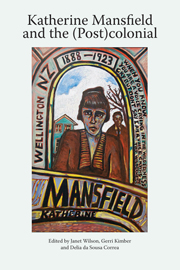Book contents
- Frontmatter
- Contents
- List of Illustrations
- Acknowledgements
- Colophon
- Introduction
- Criticism
- Creative Writing
- Reports
- The Lawrences, Katherine Mansfield and the ‘Ricordi’ Postcard
- ‘A Little Episode’: The Forgotten Typescripts of Katherine Mansfield, 1908–11
- The 2012 Alexander Turnbull Library Mansfield/Murry Acquisition
- Two French Books Belonging to Katherine Mansfield
- Editing the New Collected Fiction of Katherine Mansfield, 2 vols (Edinburgh: Edinburgh University Press, 2012), Gerri Kimber and Vincent O'Sullivan, eds
- Names Painting – Katherine Mansfield
- Reviews
- Notes on Contributors
- Katherine Mansfield Society
The Lawrences, Katherine Mansfield and the ‘Ricordi’ Postcard
from Reports
Published online by Cambridge University Press: 05 March 2014
- Frontmatter
- Contents
- List of Illustrations
- Acknowledgements
- Colophon
- Introduction
- Criticism
- Creative Writing
- Reports
- The Lawrences, Katherine Mansfield and the ‘Ricordi’ Postcard
- ‘A Little Episode’: The Forgotten Typescripts of Katherine Mansfield, 1908–11
- The 2012 Alexander Turnbull Library Mansfield/Murry Acquisition
- Two French Books Belonging to Katherine Mansfield
- Editing the New Collected Fiction of Katherine Mansfield, 2 vols (Edinburgh: Edinburgh University Press, 2012), Gerri Kimber and Vincent O'Sullivan, eds
- Names Painting – Katherine Mansfield
- Reviews
- Notes on Contributors
- Katherine Mansfield Society
Summary
Scholars have known for some time about the postcard which D. H. Lawrence sent to Katherine Mansfield from her birthplace, Wellington, on Tuesday 15 August 1922, during his first (one-day) stop en route from Sydney to San Francisco with his wife Frieda on board R. M. S. Tahiti. Mansfield mentions receiving it in a letter to John Middleton Murry written five weeks later and first published in 1951: ‘I had a card from Lawrence today – just the one word ‘Ricordi’. How like him. I was glad to get it though.’ In the absence of the postcard itself, these few comments led people to assume that it contained no more than that single Italian word, meaning ‘Memories’ or ‘Remembrances’. The poignancy of Lawrence's gesture in sending the card has naturally attracted attention from biographers, several of whom have noted the uncanny coincidence of Lawrence writing it on 15 August and Mansfield bequeathing Lawrence one of her books in her will the day before, on the other side of the world.
Fortunately, the postcard has now come to light in the cache of papers belonging to the Murry family recently acquired by the Alexander Turnbull Library. It is reproduced here for the first time. The new details it reveals shed a fascinating light on specific aspects of the complex and troubled friendship between Lawrence and Mansfield.
- Type
- Chapter
- Information
- Katherine Mansfield and the (Post)colonial , pp. 149 - 153Publisher: Edinburgh University PressPrint publication year: 2013



